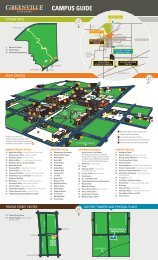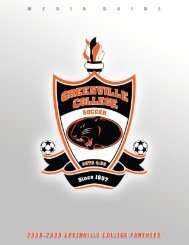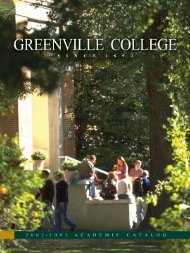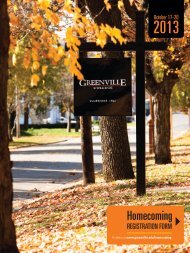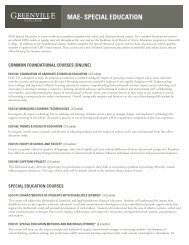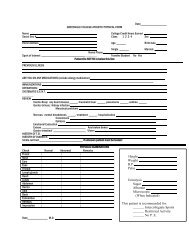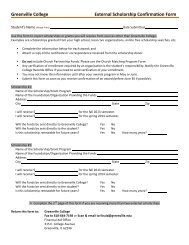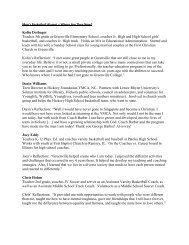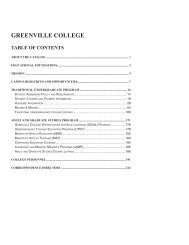2012-2014 UndergraduateCatalog.pdf - Greenville College
2012-2014 UndergraduateCatalog.pdf - Greenville College
2012-2014 UndergraduateCatalog.pdf - Greenville College
Create successful ePaper yourself
Turn your PDF publications into a flip-book with our unique Google optimized e-Paper software.
EDUCATIONAL FOUNDATIONS<br />
at Brown University. After 23 years, ownership passed to James Park Slade, who maintained the<br />
affiliation but changed the <strong>College</strong> to a co-educational institution.<br />
In 1892, ministerial and lay leaders of the Central Illinois Conference of the Free Methodist Church<br />
purchased the property of Almira <strong>College</strong>, consisting of “Old Main” and several acres of land, to<br />
provide higher education for both men and women under distinctive Christian influences. The<br />
institution was reincorporated as an independent institution under the name of <strong>Greenville</strong> <strong>College</strong><br />
Corporation and was authorized to confer the usual degrees.<br />
The <strong>College</strong> and the Free Methodist Church share a commitment to a Wesleyan theological<br />
tradition and have maintained the rich legacy of mutual support in a voluntary relationship since<br />
reincorporating in 1893. Wilson T. Hogue, a New York pastor and scholar, was called to be the<br />
<strong>College</strong>’s first president. During his administration, he not only taught and directed the <strong>College</strong>,<br />
but also earned his Ph.D. degree. Only ten individuals have served the <strong>College</strong> as president during<br />
its more than 110-year history.<br />
Since the first graduate in 1898, <strong>Greenville</strong> <strong>College</strong> has granted degrees to more than 8,000<br />
students. The quality of our graduates is made clear in their accomplishments. An unusually high<br />
proportion have gone on to earn doctorates. Alumni serve with distinction in major professions<br />
in government, business, the church, Christian missions, and as faculty of major universities and<br />
colleges.<br />
<strong>Greenville</strong> <strong>College</strong> is a part of the friendly, Midwestern town of <strong>Greenville</strong>, Illinois, located near the<br />
junction of U.S. Interstate Highway 70 and Illinois Highway 127, about 50 miles east of St. Louis.<br />
The town is an attractive residential community of approximately 7,500 people. The eight-acre<br />
central academic campus is within two blocks of <strong>Greenville</strong>’s town square and shopping area. Three<br />
lakes are located within a few miles of the campus, including Carlyle Lake, the largest recreational<br />
lake in Illinois. Though rural, the town enjoys the urban advantages of metropolitan St. Louis with<br />
its concerts, sports events, cultural attractions, and large international airport.<br />
Theological Assumptions 1<br />
Our faith commitments and our understanding about the nature of God and creation profoundly<br />
shape <strong>Greenville</strong> <strong>College</strong>. They are central to all we do. The theological assumptions are<br />
foundational for understanding our institutional objectives and program of general education.<br />
As Christians, we believe that God exists and is presently and actively engaged in the lives of people.<br />
Though we employ terms such as wonderful, powerful, righteous, loving, all-knowing, merciful,<br />
and holy to describe God, none of them alone, or even in total, can completely capture the identity<br />
of God. Because that identity must be both experienced and learned, we commit ourselves to a<br />
living and learning environment that nurtures the whole person. We affirm that, as God’s creatures,<br />
persons are endowed with the ability to respond, and ultimately know and achieve intimacy with<br />
God. This intimacy with God results in life growing ever more harmonious with God’s nature,<br />
which can be described in terms of goodness, beauty, truthfulness, freedom, and love. Because these<br />
qualities transcend all cultural, historical, and ethnic boundaries, <strong>Greenville</strong> <strong>College</strong> seeks to do the<br />
same.<br />
We have seen that humanity does not live in harmony with God, and we seek to understand why.<br />
We believe that God is helping us to gain this knowledge, both through revelation and by discovery<br />
in that which God has done in history and has made in creation. Refusing to embrace this<br />
revelation and to begin the journey of discovery is at the root of humanity’s problem. This problem<br />
has traditionally been defined as sin and can be best understood in terms of its consequences:<br />
alienation in all relationships, captivity to sin, and a darkened heart and mind. Death is the<br />
ultimate experience of this alienation and darkness. We understand that the person of Jesus<br />
Christ is the revelation of God, and the work of Christ redeems all creation, dispels the darkness<br />
of ignorance, frees people from captivity to sin, and restores all relationships. All this is mediated<br />
through the ministry of the Holy Spirit, holding the hope of redemption and life for humankind.<br />
4 | <strong>2012</strong> - <strong>2014</strong> ACADEMIC CATALOG



